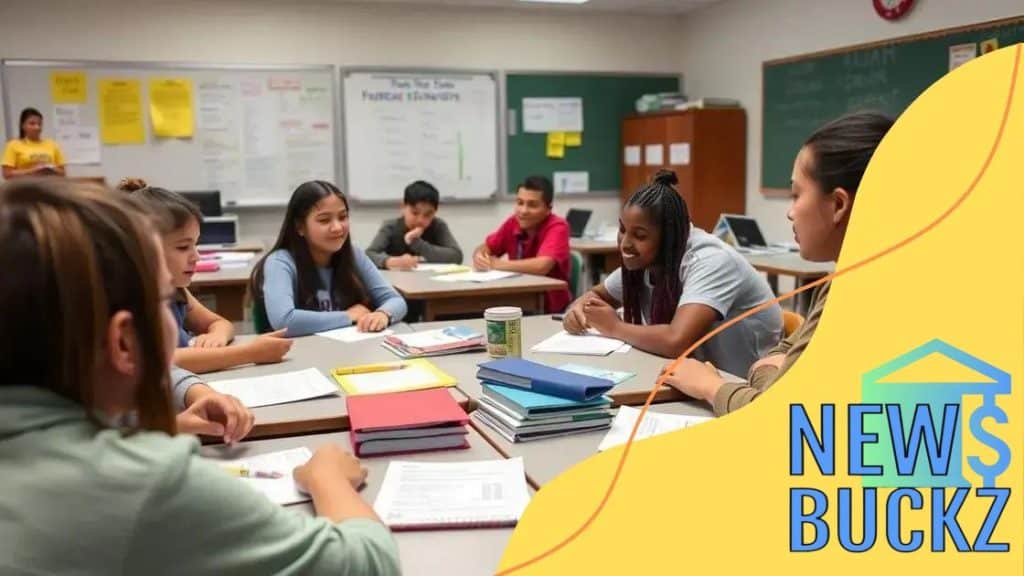The importance of financial literacy education in high schools

Anúncios
The importance of financial literacy education in high schools lies in equipping students with essential money management skills, enabling them to budget, save, invest, and make informed financial decisions for their futures.
The importance of financial literacy education in high schools cannot be understated. It shapes how students view money, savings, and investments, preparing them for real-world financial decisions. Ever wondered how this knowledge impacts their futures?
Anúncios
Understanding financial literacy
Understanding financial literacy is crucial for everyone, especially students in high school. It equips them with essential skills to navigate the complexities of money management effectively. Having a strong grasp of financial concepts helps teens make informed decisions and prepares them for their future.
What is Financial Literacy?
Financial literacy encompasses a wide range of topics. It includes understanding how to budget, save, invest, and use credit wisely. Each of these skills contributes to better financial health and stability.
Some important topics include:
Anúncios
- Budgeting techniques
- The importance of saving
- Understanding credit scores
- Basics of investing
Learning these topics in high school provides students with tools to succeed. Financial problems, such as debt and insufficient savings, often arise from a lack of knowledge. By being financially literate, young adults can avoid common pitfalls and plan for their future with confidence.
In addition to theoretical knowledge, applying these concepts in real-life situations is essential. For instance, creating a budget allows students to manage their money effectively. Tracking expenses and understanding where their money goes can help them make better choices.
Furthermore, learning about credit and loans influences how students will approach borrowing in the future. Knowledge of interest rates, repayment terms, and credit card usage can prevent them from accumulating debt.
Overall, understanding financial literacy lays the groundwork for responsible financial habits. It promotes lifelong skills that foster independence and resilience, ultimately enabling teens to manage their finances successfully and confidently pursue their goals.
Why financial education matters for teens
Understanding why financial education matters for teens is essential to their growth. As they transition into adulthood, they face many financial decisions that can impact their future. Learning about money management at a young age sets the foundation for smart financial habits.
The Benefits of Financial Education
Financial education empowers teens by providing knowledge and skills necessary to navigate their financial journeys. This knowledge enables them to set realistic financial goals and create strategies to achieve them.
Key benefits include:
- Improved decision-making skills
- Better money management
- Increased confidence in financial choices
When teens understand how to manage their finances, they can avoid common pitfalls like overspending and high debt levels. This knowledge helps them appreciate the importance of savings and investment, leading to greater financial stability. Financial education also teaches them the implications of interest rates and how borrowing works.
As they learn to budget for their own needs, it fosters a sense of responsibility. For instance, managing allowance or earnings from a part-time job encourages them to save for larger purchases. This practice instills discipline and foresight, crucial traits for future financial independence.
Furthermore, financial literacy promotes critical thinking about the economy and their future goals. Teens who understand these concepts are better equipped to choose paths that lead to financial security. They are more likely to pursue higher education or vocational training while managing costs effectively. Knowing how to compare student loan offers or scholarships can significantly reduce future burdens. In conclusion, when we emphasize the importance of financial education for teens, we prepare them to build a strong foundation for a successful financial future.
Key topics to teach in high school
 When teaching financial literacy in high school, covering key topics is vital to ensure students are prepared for real-world financial situations. Understanding these concepts helps them make sound financial decisions.
When teaching financial literacy in high school, covering key topics is vital to ensure students are prepared for real-world financial situations. Understanding these concepts helps them make sound financial decisions.
Essential Financial Concepts
Prioritizing topics in your curriculum can create a strong foundation for students. Here are a few key subjects to cover:
- Budgeting: Teaching students how to create and maintain a budget lays the groundwork for financial stability.
- Saving: Discussing the importance of saving for emergencies and future goals encourages good habits early on.
- Understanding credit: Teaching what credit is, how to use it responsibly, and how credit scores work helps prevent future debt issues.
- Investing basics: Introducing concepts like stocks, bonds, and mutual funds fosters an understanding of how investments can grow wealth.
These topics provide a comprehensive view of personal finance. Students should learn to track their income and expenses accurately, allowing them to see where their money is going. Being aware of the difference between needs and wants encourages better spending habits.
As students learn about credit, they will understand how to apply for loans, the significance of interest rates, and the impact of timely payments on their credit scores. This knowledge can prevent them from making detrimental decisions in the future.
Additionally, teaching about investing prepares students for long-term financial growth. Explaining how compound interest works can inspire them to start saving and investing early, maximizing their future financial potential.
Incorporating real-life scenarios into lessons makes these concepts relatable. Using case studies or simulations to help students practice budgeting and investing reinforces learning. Overall, covering these key topics empowers students and equips them with practical skills for their financial futures.
Real-life applications of financial knowledge
Understanding the real-life applications of financial knowledge can empower students to make informed decisions. Applying what they learn in the classroom to daily life will reinforce these important concepts. It’s crucial to bridge classroom learning with real-world practices.
Practical Money Management
One major application is managing money effectively. Students can use budgeting skills learned in school to track their income and expenses. Keeping a budget helps them understand where their money goes and aids them in saving for future goals.
Examples include:
- Saving for a new phone or gaming console
- Planning for college expenses
- Setting aside money for emergencies
Another real-life application is about understanding credit and loans. It’s essential for teens to realize how loans work and the importance of maintaining a good credit score. By learning how to manage their credit wisely, they can avoid falling into debt traps. Additionally, they gain the ability to make informed decisions about taking out loans for cars or education.
Investing is another area where financial knowledge applies. Students can take what they learn about stocks, bonds, and mutual funds and begin to invest small amounts. Understanding the power of compound interest demonstrates how money can grow over time. By making informed investment choices, students can take steps toward securing their financial future.
These applications illustrate how financial knowledge is not only theoretical but also immensely practical. Students should engage in discussions about everyday financial decisions. This practice will prepare them for real-world financial challenges, ensuring that they can navigate their financial lives confidently and responsibly.
Fostering this understanding encourages a sense of responsibility and independence, allowing students to develop lifelong financial skills that will serve them well in the future.
Overcoming barriers to financial education
Overcoming barriers to financial education is essential for ensuring that all students have access to important knowledge and skills. Many students face obstacles that can hinder their ability to learn about managing money and making sound financial decisions. Addressing these barriers is key to promoting financial literacy effectively.
Common Barriers
One major barrier is the lack of resources in schools. Not all schools have the financial means to provide comprehensive financial education programs. This often leads to students missing out on critical instruction that could benefit them in the future. Additionally, some teachers may not feel confident in teaching financial topics if they lack training or resources.
Barriers can also include students’ diverse backgrounds. Many students come from households where financial topics are not discussed, leaving them unaware of important concepts. This discrepancy can create a gap in knowledge and skills. To help bridge this gap, it’s vital to offer accessible materials that speak to different backgrounds and experiences.
Moreover, the absence of engaging content can discourage students from wanting to learn about finances. When lessons are dry or uninteresting, students are less likely to participate actively. Using interactive teaching methods, such as simulations and real-life scenarios, can help make financial education more relatable and engaging.
Strategies for Improvement
To overcome these barriers, schools should focus on improving resources and access to quality financial education. Collaborating with community organizations can bring in additional expertise and funding. Schools should also emphasize teacher training, helping educators feel more comfortable and prepared to teach these vital subjects.
Incorporating real-life applications in the curriculum can spark interest among students. By relating financial topics to their daily lives, they can see the significance of what they are learning. For instance, discussing budgeting with a mobile app or exploring investment options through simulations can create more engaging learning experiences.
Furthermore, fostering a culture that encourages open conversations about finance will empower students. When parents and mentors discuss financial topics at home, it reinforces what students learn in the classroom. Establishing support groups or financial clubs in schools can also provide a platform for students to share their experiences and learn from each other.
Each of these strategies plays a significant role in making financial education accessible and effective for all students, helping them to build the skills necessary for a successful financial future.
FAQ – Frequently Asked Questions about Financial Literacy Education in High Schools
Why is financial literacy education important for teens?
Financial literacy education is important for teens because it equips them with the skills to manage money, budget, save, and make informed financial decisions.
What key topics should be taught in financial literacy programs?
Key topics include budgeting, saving, understanding credit, investing basics, and real-life applications of financial knowledge.
How can schools overcome barriers to financial education?
Schools can overcome barriers by improving resources, providing teacher training, and creating engaging, interactive lessons that resonate with students.
What are some real-life applications of financial knowledge?
Real-life applications include budgeting for expenses, making informed decisions about loans and credit, and understanding how to invest money wisely.





